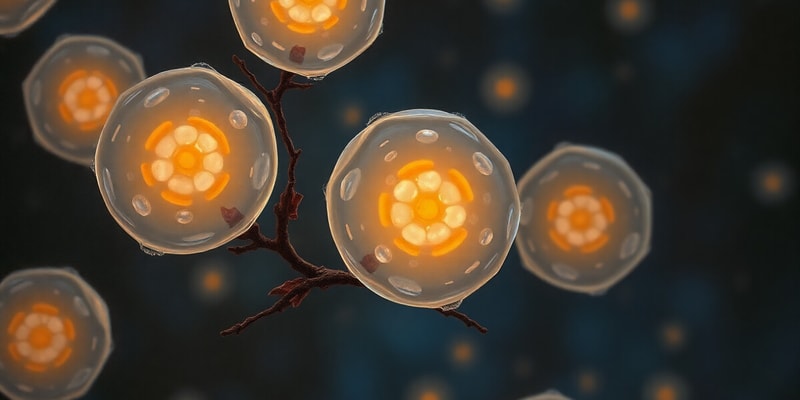Podcast
Questions and Answers
What is the recommended temperature and CO2 concentration for incubating cells?
What is the recommended temperature and CO2 concentration for incubating cells?
Which of the following methods is used to detach colonies from the iMEF layer?
Which of the following methods is used to detach colonies from the iMEF layer?
What should be added to the cells during the passaging process?
What should be added to the cells during the passaging process?
Why is the DPBS rinsing step important before adding TrypLE?
Why is the DPBS rinsing step important before adding TrypLE?
Signup and view all the answers
What is the purpose of using a disposable cell passaging tool during the passaging process?
What is the purpose of using a disposable cell passaging tool during the passaging process?
Signup and view all the answers
What is the significance of maintaining 90% humidity during incubation?
What is the significance of maintaining 90% humidity during incubation?
Signup and view all the answers
What is the centrifuge speed recommended during the cell transfer process?
What is the centrifuge speed recommended during the cell transfer process?
Signup and view all the answers
What is the role of MesenPRO RS™ Medium in the cell culturing process?
What is the role of MesenPRO RS™ Medium in the cell culturing process?
Signup and view all the answers
What are human embryonic stem cells (hESCs) typically maintained on?
What are human embryonic stem cells (hESCs) typically maintained on?
Signup and view all the answers
What characteristic is shared by induced pluripotent stem cells (iPSCs) and embryonic stem cells (ESCs)?
What characteristic is shared by induced pluripotent stem cells (iPSCs) and embryonic stem cells (ESCs)?
Signup and view all the answers
What type of culture medium is used for culturing iPSCs on a MEF feeder layer?
What type of culture medium is used for culturing iPSCs on a MEF feeder layer?
Signup and view all the answers
Which of the following statements is not true about iPSCs?
Which of the following statements is not true about iPSCs?
Signup and view all the answers
What is one of the main applications of induced pluripotent stem cells (iPSCs)?
What is one of the main applications of induced pluripotent stem cells (iPSCs)?
Signup and view all the answers
Study Notes
Introduction
- Human embryonic stem cells (hESCs) are grown on layers of inactive murine embryonic fibroblast (MEF) cells.
- hESCs can be maintained for several passages without compromising proliferation or pluripotency.
- Induced pluripotent stem cells (iPSCs) are reprogrammed adult cells with pluripotent stem cell-like traits, similar to embryonic stem cells.
- iPSCs are a valuable source for drug discovery, cell therapy, and basic research.
- Somatic (adult) stem cells are found in most bodily organs and tissues.
- Mesenchymal stem cells (MSCs) were initially isolated from bone marrow.
- MSCs are now found in various tissues, including cord blood and adipose tissue.
Culturing and Expansion of Embryo Stem Cell and Induced Pluripotent Stem Cell
- Isolation of hESCs involves obtaining inner cell mass (ICM) from a blastocyst.
- Isolation of iPSCs starts with somatic cells and reprogramming them.
Isolation of hESCs and iPSCs
- CytoTune®-iPS Sendai Reprogramming System uses Sendai virus vectors to deliver essential reprogramming factors.
- The CytoTune®-iPS kit contains four Sendai-based reprogramming vectors.
Prepare and Culture hESCs and iPSCs
- Coating culture vessels with appropriate solutions (e.g., AF).
- Growing mitotically inactivated MEFs on culture vessels.
- Establishing culture conditions for hESCs and iPSCs include specific medium and temperature control.
Thawing hESCs and iPSCs
- Methods for thawing hESCs and iPSCs from liquid nitrogen include step-wise thawing in a 37°C water bath.
- Different solutions and volumes are used at each step during the thawing process.
Passaging hESCs and iPSCs
- Passaging involves removing cells from the original culture vessel using enzymes like collagenase.
- Cells may be passed into a new culture vessel by being re-suspended in appropriate medium.
- Colonies are ready for passaging when they are large and close together.
- Techniques like StemPro® EZPassage™ Disposable Cell Passaging Tool can assist in passing cells.
Culturing and Expansion of Mesenchymal Stem Cells (MSCs)
- MSC isolation involves extracting cells from various tissues.
- Culturing MSCs often involves using specialized medium and maintaining specific environmental conditions (e.g., CO2, temperature).
Studying That Suits You
Use AI to generate personalized quizzes and flashcards to suit your learning preferences.
Related Documents
Description
Explore the fundamentals of human embryonic stem cells and induced pluripotent stem cells in this quiz. Understand their isolation, culturing methods, and applications in drug discovery and cell therapy. Test your knowledge on the characteristics and significance of different stem cell types.




